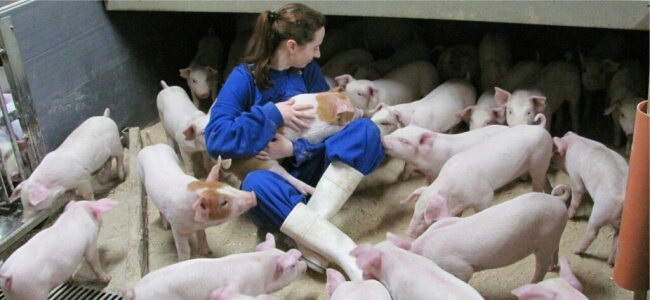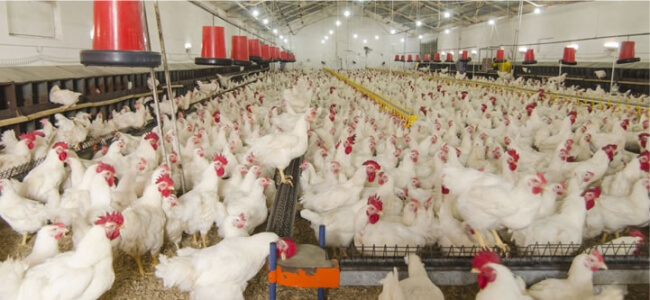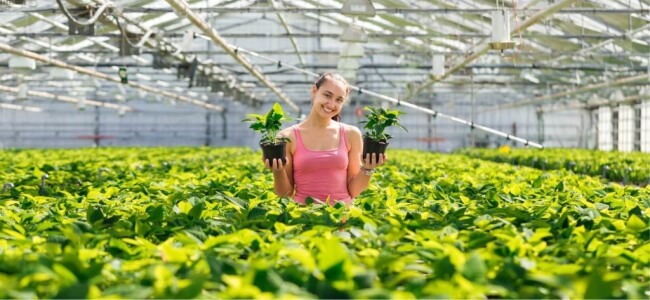The southern tip of Sweden is the most agriculturally productive. Sweden has quite short growing seasons in most parts of the country that limits the species and productivity of agriculture, but the south has the longest growing season, in some parts of the south in excess of 240 days. Wheat, rapeseed, and other oil plants, and sugar beets are common in , while barley and oat are more important further north. Barley and oat are grown mostly for animal feed especially for pigs and poultry.
The Central lowland is the traditional centre of agriculture in Sweden.
Sweden is almost self-sufficient in many agricultural products, although the sector employs no more than 2 percent of the labor force and contributes 2 percent of GDP. About 7 percent of Sweden’s land is cultivated, mostly in the southern plains. Modern farming, including fertilization and mechanization, make high yields possible although soils are generally poor and the cold climate renders the growing season much shorter than elsewhere in Europe. Farms vary in size from large to small ones, many of which combine into various larger units and cooperatives.
The politics of Sweden take place in a framework of a parliamentary representative democratic constitutional monarchy. Executive power is exercised by the government, led by the Prime Minister of Sweden. Legislative power is vested in both the government and parliament, elected within a multi-party system.
The total resident population of Swedenwas 10,343,403 in March 2020. The population exceeded 10 million for the first time on Friday, 20 January 2017.
The three largest cities are Stockholm, Gothenbrurg and Malmö. Sweden’s population has become much more ethnically, religiously and linguistically diverse over the past 70 years as a result of global immigration. Every fourth (24.9%) resident in the country has an immigrant background and every third (32.3%) has at least one parent born abroad.
One of the key characteristics of Swedish culture is that Swedes are egalitarian in nature, humble and find boasting absolutely unacceptable. In many ways, Swedes prefer to listen to others as opposed to ensuring that their own voice is heard. When speaking, Swedes speak softly and calmly.

Your main responsibility will be feeding and taking care of the pigs-insemination, castration and other. Normally working hours from 7 am to 16 pm, where you will have 2 breaks during the day

Your main responsibility will be feeding and milking the cows and small calves. All farms are equipped with modern milking systems, that include automatized machines. The program includes 2-3 milkings per day.

Your main responsibility will be feeding, taking care of chickens, collect and sort the eggs. All farms are equipped with modern stables. Working hours are from 7 am to 16 pm with 2 breaks during the day

Your main responsibility will be stickling, and taking care of the growth process. Sorting and packing different types of plants, vegetables or flowers.
Sweden welcomes students of agricultural higher educational institutions for on-the-job training in the agricultural sector. Swedish farms and greenhouse facilities take leading positions in the global rating by such criteria as the introduction of innovative technologies, ecology and humanity of manufacturing, livestock management quality control, production process and realisation of output. Sweden food products are considered one of the most qualitative and ecologically cleanest in the world.
If you have moved to Sweden from abroad and are planning to live in Sweden for one year or more, you are generally required to be registered in the Swedish Population Register.


You as a trainee, is obligated to take up a medical insurance for your entire stay in Sweden. This health insurance should cover you at all time (work and free time) and you need to coordinate with your insurance company if you need to go to the doctor.
In case of illness, you should go to your local health centre (Vårdcentralen), which provides doctors, nurses and other specialists. Primary care used to be relatively low in Sweden. However, primary care physicians (equivalent of a GP) are now the norm. You will have no problem to find a doctor in Sweden as all municipalities have a health centre. For information you can call the 24h non-emergency health number 1177.
As a Swedish resident, you can obtain a Swedish identity card, ID card, from the Swedish Tax Agency.
The Tax Agency ID card is an approved form of identification within Sweden. You can use the ID card as proof of your age and identity at places such as pharmacies, banks or in shops.


The easiest way to open an account is to visit a bank branch in person. You usually need proof of address and your passport or Swedish ID card, but contact your bank or check its website for more details. Keep in mind that most banks require you to have a Swedish personal identification number when opening an account.
The four main banks in Sweden are Handelsbanken, Swedbank, Nordea and SEB. Bank offices are generally open Monday–Friday, 10am–4 pm.
If you come to Sweden to live and work here you may receive a personal identity number, if you are staying for longer than one year. If you are going to live and work here but do not fulfil the requirements to be registered in the Swedish Population Register, you will receive a coordination number instead. You receive a coordination number when you get a decision from the Swedish Tax Agency on how you will be taxed. Always use coordination number or personal identity number when contacting the Swedish Tax Agency.
In Sweden a working week is 40 hours, accumulated into 172 hours a month. A working day lasts app. 8 hours – excluding self-paid breaks.
When you will arrive to Swedej, the host-family will meet you at the airport and drive you to the house/apartment and will help you to accommodate there. The accommodation price is 200-250€ per month
When you are coming to Sweden for longer period of time, it is always a good idea to get a Swedish number – of course if operator from your country is not offering something better. The cheapest option is Lycamobile operator.
• 8GB -19 SEK, unlimited calls in Europe, 100
min of international calls, EU roaming
• 12GB -64.50 SEK, unlimited calls in Europe,
200 min of international calls, EU roaming
•149GB -149SEK, unlimited calls in Europe, 300
min of international calls, EU roaming
Discount supermarkets that you want to look for are Wilys, Lidl and MatDax and CityGross. Those supermarkets are the best choice for daily shopping as well as for their special offers (always look for a sign Tilbud – discount). Every week you can find different special offers in each shop.
The five discount supermarkets that you want to look for are Netto, Fakta, Aldi, Lidl and Rema 1000. Netto and Fakta are Danish, Rema1000 is Norwegian and the rest are German. Nevertheless those five supermarkets are the best choice for daily shopping as well as for their special offers (always look for a sign Tilbud – discount). Every week you can find different special offers in each shop
Copyright © 2018 Bixter.work. All rights reserved. Bixter.work is a registered trademark. Made in Scandinavia